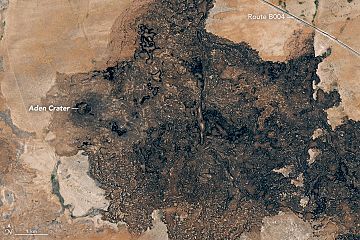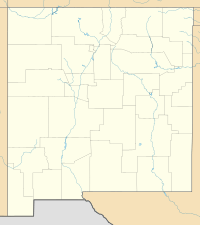Aden Crater facts for kids
Quick facts for kids Aden Crater |
|
|---|---|

Aden Crater, New Mexico
|
|
| Highest point | |
| Elevation | 4,477 ft (1,365 m) |
| Geography | |
| Location | Doña Ana County, New Mexico, U.S. |
| Topo map | USGS Aden Crater |
| Geology | |
| Mountain type | shield volcano |
| Volcanic field | Potrillo volcanic field |
| Last eruption | ca. 16,000 years ago |
Aden Crater is a small shield volcano located in Doña Ana County, New Mexico, USA. It is about 25 miles (40 km) southwest of Las Cruces, New Mexico. This volcano is part of a larger area known as the Potrillo volcanic field.
Scientists found a fossil of a giant ground sloth inside the crater! This amazing discovery was made in a deep crack, about 100 feet (30 meters) down. They also found the sloth's fossilized poop, called coprolites. These fossils are now kept at the Peabody Museum.
Aden Crater has not erupted in modern times. Its last known eruption happened around 16,000 years ago. The lava flows from the crater formed in two main stages. The first flows were very runny and spread out far. Later flows were thicker and built up the volcano's shape closer to the center.
Contents
What is Aden Crater?
Aden Crater is a type of volcano called an Icelandic-type shield volcano. It formed from many eruptions of very fluid lava. This lava built up a low, wide hill about 3 to 4 miles (5 to 6.5 km) across. The sides of the hill are very gentle, sloping only 3 to 5 degrees.
Inside the Crater
The top of the hill has a large crater, about 1,400 feet (425 meters) wide. The edge of the crater is made of cooled lava splashes that dip steeply inside. The crater itself once held a lava lake. You can still see a small cone and a collapsed pit inside the southeastern part of the crater.
Cool Features Around the Volcano
The area around Aden Crater is full of interesting volcanic features. These include:
- Explosion craters: Holes formed when gas exploded.
- Collapse pits: Sunken areas where the ground fell in.
- Spatter cones: Small, steep cones built from blobs of lava.
- Hornitos: Small, chimney-like vents that form on lava flows.
Many of these features are found on a low ridge that stretches southeast from the crater. There's also a group of spatter cones southwest of the main crater.
A unique feature in this area is something called herraduras. These are horseshoe-shaped ridges of lava. Scientists think they formed when lava pushed up through cracks in the crust of an older lava flow.
How Aden Crater Formed
Aden Crater is located in a special geological area called the Rio Grande rift. This is a place where the Earth's crust is slowly being pulled apart and getting thinner.
The Rio Grande rift has:
- Deep basins filled with sedimentary rocks.
- Recent faulting (cracks in the Earth's crust).
- Lots of volcanic activity.
- High heat coming up from the Earth's mantle (the layer below the crust).
Aden Crater sits on top of a smaller rift called the Aden rift. This rift runs through the crater and is marked by collapsed pits to the southeast. The volcano is also near the Robledo fault. Both the Aden rift and the Robledo fault are thought to have provided pathways for hot magma to rise from deep within the Earth and erupt onto the surface.
 | Selma Burke |
 | Pauline Powell Burns |
 | Frederick J. Brown |
 | Robert Blackburn |


